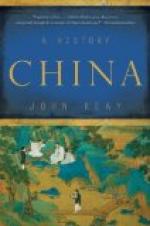The Hsien-pi of the newly conquered east no longer belonged to any tribe, but only to military units. They were transferred as soldiers to the Toba court and placed directly under the government, which was thus notably strengthened, especially as the millions of peasants under their Chinese officials were also directly responsible to the central administration. The government now proceeded to convert also its own Toba tribes into military formations. The tribal men of noble rank were brought to the court as military officers, and so were separated from the common tribesmen and the slaves who had to remain with the herds. This change, which robbed the tribes of all means of independent action, was not carried out without bloodshed. There were revolts of tribal chieftains which were ruthlessly suppressed. The central government had triumphed, but it realized that more reliance could be placed on Chinese than on its own people, who were used to independence. Thus the Toba were glad to employ more and more Chinese, and the Chinese pressed more and more into the administration. In this process the differing social organizations of Toba and Chinese played an important part. The Chinese have patriarchal families with often hundreds of members. When a member of a family obtains a good position, he is obliged to make provision for the other members of his family and to secure good positions for them too; and not only the members of his own family but those of allied families and of




